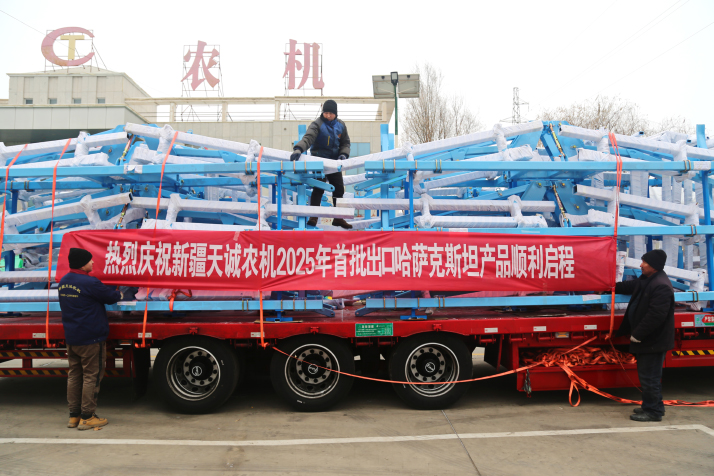| Xinjiang Today |
| A region at a commercial crossroads | |
|
|
 Workers load agricultural equipment to be exported to Kazakhstan onto a truck in Tiemenguan City, Xinjiang Uygur Autonomous Region, on January 14 (VCG)
Xinjiang, a region that has a long history of international exchanges, is expected to play a major role in China's opening up, Xing Guangcheng, Director of the Institute of Chinese Borderland Studies at the Chinese Academy of Social Sciences, said in an interview with Xinjiang Today. Xing, also a Xinjiang delegation deputy to the National People's Congress, China's top legislature, believes within the evolving framework of the Belt and Road Initiative (BRI), Xinjiang is poised to renew its ancient role. Edited excerpts of the interview follow: Xinjiang Today: What lessons can be drawn from Xinjiang's historical openness for the BRI? How can the region fully leverage its geographical advantages? Xing Guangcheng: Xinjiang holds an extremely important position in China's strategic framework. Historically, the northwestern frontier, especially Xinjiang, has served as a security buffer for China. Since Chinese Han Dynasty (206 B.C.-220 A.D.) envoy Zhang Qian's diplomatic missions to the Western Regions opened the Silk Road, Xinjiang has acted as a bridge and conduit for economic, political and cultural exchanges between China and Central Asian countries. The concept of the "Silk Road," initially coined by German scholar Ferdinand von Richthofen, primarily refers to the exchanges between Xinjiang and other parts of the Eurasian Continent. Later, this concept was expanded to encompass all Eurasian land-based trade routes. Xinjiang's pivotal role in the Silk Road is self-evident—without Xinjiang, exchange of information between China and other Eurasian countries would have been more challenging to achieve. From both security and exchange perspectives, Xinjiang's historical role has been vital and in the present day, these functions have been further enhanced. Xinjiang borders eight countries spanning North Asia, Central Asia, South Asia and West Asia. Therefore, in China's foreign relations, particularly with neighboring countries, it shoulders multiple responsibilities in areas such as security, politics, openness and regional cooperation, underscoring its importance. The BRI, which aims to boost connectivity along and beyond the ancient Silk Road routes, consists of the Silk Road Economic Belt and the 21st-Century Maritime Silk Road. The Silk Road Economic Belt encompasses six corridors, with Xinjiang as its core area. This further highlights Xinjiang's central role in national strategy. The region's security, stability and development not only concern itself but are also of paramount importance to the entire country, impacting national stability, modernization efforts and the great rejuvenation of the Chinese nation. In 2023, the Central Government proposed five strategic positions for Xinjiang, the first being a passageway to Eurasia and a gateway to Central Asia. Xinjiang plays a vital role in China's comprehensive opening up, particularly in the building of a China-Central Asia community with a shared future, where it serves as a forerunner. Moreover, the China-Kazakhstan Huoerguosi (Khorgas or Horgos) International Border Cooperation Center exemplifies Xinjiang's innovative role in regional cooperation, showcasing its uniqueness in transnational collaboration. What challenges do you think Xinjiang faces in its opening up? In recent years, Xinjiang has made progress in opening up, with foreign trade growing consistently. From 2022 to 2024, its import and export volume reached 246.36 billion yuan ($34 billion), 357.33 billion yuan ($49 billion), and 435.11 billion yuan ($60 billion), respectively. In 2024, its foreign trade soared 21.8 percent year on year, ranking third nationwide in terms of growth rate. Some of the greatest challenges Xinjiang faces are the defamation and containment efforts by Western countries. I have observed biases in Western academia and politics regarding Xinjiang, which align with their mainstream political positions. This has led to intensified legislative actions in the United States and some European countries targeting Xinjiang in recent years. The U.S. and its allies have fabricated accusations like "forced labor" and "genocide" to tarnish Xinjiang's—and China's—global image. These efforts are part of a broader strategy to curb China's development. Through legislation, government policies and media narratives, the U.S. has systematically attacked Xinjiang, including imposing sanctions on its cotton and other industries. Successive U.S. administrations, from Barack Obama to Joe Biden, have signed related laws threatening China's core interests. In response, Xinjiang has engaged in extensive cultural and academic exchanges with other countries, and China has repeatedly refuted false allegations on international platforms. As a scholar, have you participated in any of these exchanges? I have participated in numerous international exchanges, engaging in direct dialogue with Western scholars and policymakers. For example, during a 2019 visit to Europe, I had intense discussions with officials and scholars from Germany, France and the United Kingdom. These discussions continued online during the COVID-19 pandemic. Many developing countries, particularly those in the Arab world, support China's stance. During our conversations, scholars and officials from Arab League members including Egypt, Oman and the United Arab Emirates expressed solidarity, suggesting further diplomatic efforts to clarify the facts. Comments to mamm@cicgamericas.com |
|
||||||||||||||||||||||||||||
|